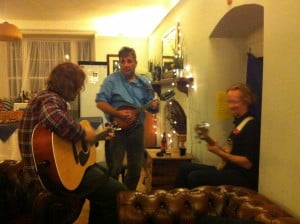 Ecclesiology and Ethnography: Take Two
Ecclesiology and Ethnography: Take Two
September is lovely time to visit England. I entered and departed the U.K. through London. The city is England’s gateway to the world and recently played host to the Olympic and Paralympic summer games. A partial day in the city, with a quick tour high atop a double-decker bus, provided me visual images for the dramatic significance of London’s landscape, history and cultural context.
Most of my trip, however, was concentrated on the Ecclesiology and Ethnography Conference held in St. John’s College at Durham University, in the north of England near Newcastle Upon Tyne. A side trip to Oxford deserves its own post (coming later). In this post I want to tell you a little about the conference, my second one in in six months. I will also tell you about this emerging network of scholars devoted to the study and deeper understanding, even critical revision, of the Christian church.
Ordinary Ecclesiology
‘Ordinary Ecclesiology’ was the theme for the conference. Ecclesiology is an academic word for the study and theology of, for, and about the church. Decades ago anthropologists and sociologists turned their attentions away from grand ideas alone as adequate for interpreting the worlds they studied. Gradually, they expanded their focus to ordinary, everyday practices to get a better understanding of what goes on and how people live. Historians, theologians, biblical scholars, and others who study religion, are in growing numbers exploring the intersection of ideas and practices using qualitative and quantitative methods of research. Some scholars even call this ‘field notes in theology.’
In the last couple of decades anthropology began to turn its critical eye upon itself, no longer believing its view of ‘others’ could be adequate scholarship. Anthropologists began to ask how their studies of culture and people were also political and how they revealed as much about their own situations as they did about the ‘others.’ Theologians, particularly those who understand themselves as practical theologians, have also turned their attentions increasingly toward the use of research methods that attend to concrete experiences of culture and people to understand more carefully what is going on in the world and what theological difference it makes.
Ethnography
Ethnography is both the study of a cultural context, people and place, and it is also the write-up or report of that study into books and essays. As latecomers to the use of ethnographic methods, theologians have several steep learning curves if they wish to orient themselves to ethnographic practice: 1) learning methods of qualitative research itself; 2) finding ways to interface between qualitative research and normative theological meaning-making; 3) producing credible studies that make both constructive arguments and critical contributions to theological knowledge; and 4) finding ways to speak to both academic audiences and church members and leaders who can benefit from greater knowledge of their contexts.
The field of pastoral theology has been about a task similar to that of ethnography with a slightly different focus for nearly a century. Protestant pastoral theology has studied the situations of churches, ministries of caregiving, and instances of crisis and change. The work of pastoral theology includes the important step of theological reflection on each of these situations through use of cases studies and verbatim (recounting words and actions in a pastoral interaction). Pastoral theology at its best offers both care for the people and situations themselves as well as critical re-constructions of theological doctrine in light of concrete experience. I wrote a paper comparing the field of pastoral theology with the newer conversation between ecclesiology and ethnography for companion conference in the U.S. in May of this year. You can read my reflections about that conference here.
Ecclesiology + Ethnography

In Durham, the E&E conference gathered together about 30 people, many of them graduate students and those recently finished with doctoral studies, as well as a few senior scholars. It was the first time that the Learning Pastoral Imagination Project presented findings to an audience outside the U.S. I shared a ‘mash-up’ paper with some of our thinking from several existing papers and a bit of new material. The new material pushed a bit further into the territory of what our findings tell us about the context of ministry itself in the U.S. and how it gives shape to pastoral imagination.
The other presentations (nearly 20 in all) ranged from surveys of social media used by churchgoers and religious habits of college students in the U.K., to the spirituality of pastors and worship habits of youth in Norway, to shifts in identity in an emergent congregation and in a process of ‘deconversion’ among Roman Catholics in the U.S. I found myself wondering over and again, as I read the papers in advance and heard the presentations, what the findings of these studies might say more explicitly about the situations or contexts where the studies took place. Many of the presentations reported what participants said or thought. Yet I confess, I was hoping more of the studies would take the next step by venturing into the territory of context itself, risking a constructive proposal or critical engagement with the situations.
Next
Although a number of the studies had something to say about what ‘ordinary theologies’ a group of people held, they didn’t have as much to say about how these beliefs, convictions, or practices, came into being, or were learned over time, or how they were shaped by forces in and beyond the immediate churchly contexts. These ‘how’ questions, as well as the constructive questions, are important for articulating the meaning that such studies may offer.
The intersection of ecclesiology and ethnography is still a relatively new site of theological discovery, conversation and meaning-making. A series of books, and hopes for a new journal, are emerging from the questions and conversations. It is fun and engaging to be part of these conversations! And I for one, remain interested to see where they lead.






Thanks to Tom Beaudoin and Tim Snyder for also sharing some thoughts about the E&E conference. You can read their reflections at their respective blogs…
Rock and Theology: http://www.rockandtheology.com/?p=5855
Theology and Culture: http://theologyandculture.org/ordinary-ecclesiology-in-durham/